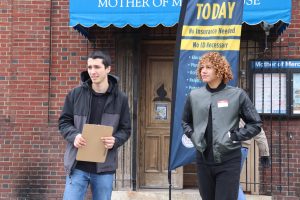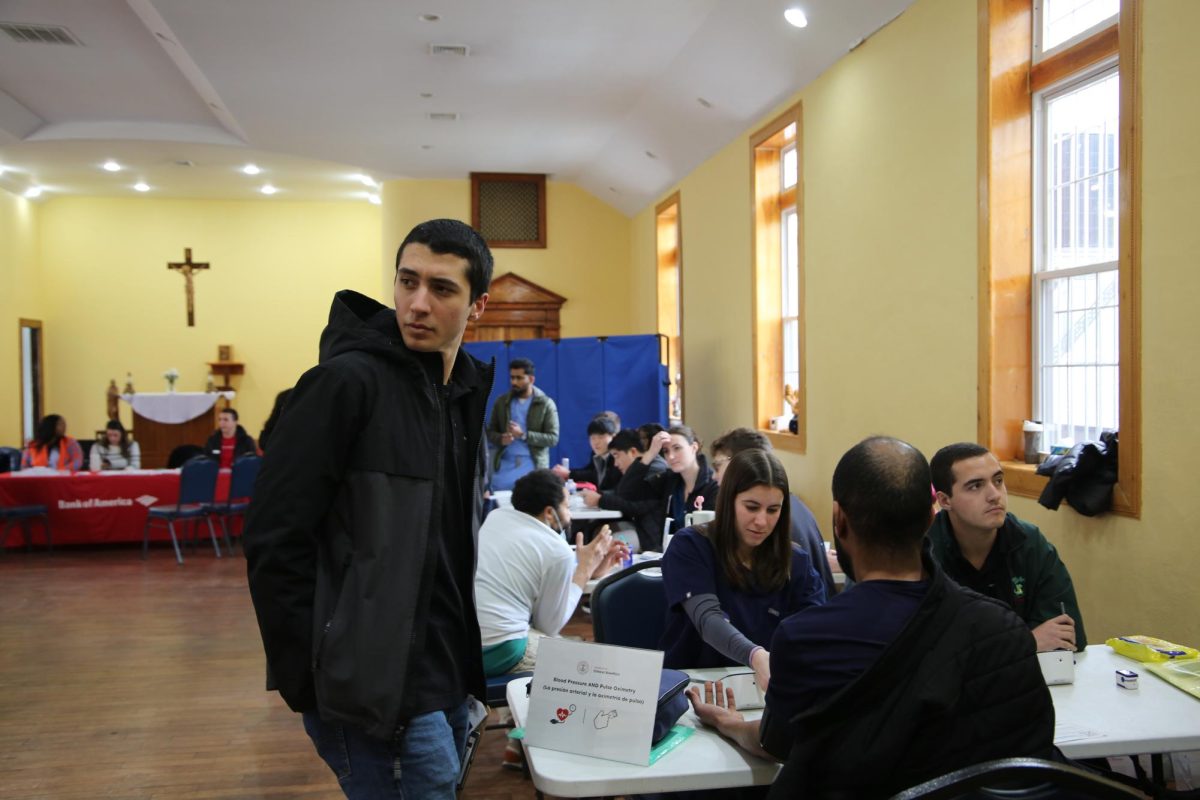From a young age, Fredy Abboud ’26 was drawn to the union of science and humanity.
“I’ve always been interested in the complexity of the human body, of the physiology and everything of that sort,” Abboud said. “I look towards the medical profession as one way to dive deeper into that.”
Abboud, a biology major, grew up in Norwood, Pennsylvania, a small borough in Delaware County, graduating from Interboro High School in 2022.
Now pursuing his education in hopes of becoming a doctor, Abboud has transformed his childhood fascination into action. He is one of the founders of the BIPOC Health Promoter Program, managed by St. Joe’s Institute of Clinical Bioethics.
The Health Promoter Program runs five free health clinics in underserved communities in the Philadelphia area and beyond. The Institute’s first program, the African Health Promoter Program, was launched in 2012. There are now four additional programs: the Hispanic Health Promoter Program, the Asian Health Promoter Program, the Mobile-Rural Health Promoter Program and the BIPOC Health Promoter Program, which began in February 2023 during Abboud’s sophomore year.
At least one Saturday or Sunday a month, alternating among the clinic sites, trained clinician volunteers perform tasks ranging from measuring body mass index, blood pressure/glucose and cholesterol testing to eye care, prenatal testing and dental care. Additional care includes preventative medicine, wound care and oncology screening.
The BIPOC program partners with Mother of Mercy House, a nonprofit located on Allegheny Avenue in the Kensington neighborhood of Philadelphia. Many Black, Indigenous and people of color communities (BIPOC) live in poverty in this neighborhood, which has been an epicenter of drug use in the city. People who use heroin in the neighborhood also take Xylazine, a horse tranquilizer, which can cause open wounds that are prone to infection.
Abboud, who is a co-lead coordinator on the BIPOC Health Promoter Program, still remembers one of the first times he showed up at the Mother of Mercy House. Before arriving, all Abboud could think of was making sure supplies were packed for the roughly 200 people who were expected to show up.
“The day of, we come in, set up for the first hour, and barely 20 people showed up,” Abboud said.
The volunteers still had three hours to go. Abboud and another student volunteer acknowledged that standing around was unproductive, so they decided to walk down the street to see if they could bring people in.
“We walked down and saw agitated people in a terrible, awful state. They need help. It was in an area that has been partly abandoned by social services,” Abboud said. “Many of them are uninsured, and many of them don’t even have IDs.”
Abboud had never encountered such a sight: the skin wounds on those suffering from substance use disorder, some requiring amputation, others near death and many unable to move. He saw people injecting IVs and taking drugs freely. Some were so intoxicated they were unaware of their surroundings.
Then Abboud and the other volunteer came across a woman who needed emergency help.
“She was unconscious, and she seemed to be thrown into respiratory depression. So, we came in and noticed that she had a bracelet around her hand, which says she had gone AMA, ‘against medical advice,’” Abboud remembered. “She [had] left the hospital.”
They managed to wake her up and called an ambulance to get her to a hospital safely.
“Then, we walked down 50 feet and then we come across a person who’s wheelchair-bound but has bilateral wounds on his left leg,” Abboud said.
At that point, the students were too far from the Mother of Mercy House to treat the man there, as he could not move from his location. He was unhoused and could not carry his belongings to the station.
“We had to go back to Mother Mercy, then bring the medical doctors, bring the supplies and treat him on the street,” Abboud said.
Abboud and other team members realized that venturing out on the streets was the best way to engage the people who needed wound care the most. As a result, the BIPOC program was adjusted.

“We created two teams,” said Peter Clark, S.J., Ph.D., professor of theology and religious studies and director of bioethics at the Institute of Clinical Bioethics. “We have two mobile wound care teams. It’s a medical resident, a medical student and one of our undergrads. We go out onto the streets, and we do wound care on the streets of Allegheny Avenue.”
Clark said the incident reminded him of the parable of the Good Samaritan.
“A man is laying along the side of the road. The priest walks by and moves to the other side of the road. The Levite walks by. It’s the Samaritan, the pagan, who sits down, helps the man, brings them to the inn and takes care of them,” Clark said. “That’s what our kids were doing … People were walking by on the sidewalk, and there’s our kids out there in the middle of the street taking care of these people, cleaning their wounds.”
After hours of work on the streets of Alleghany, Abboud’s greatest takeaway is the relationships built outside of the program. Seeing his colleagues in the field is rewarding, he said, knowing they are fulfilling their medical mission through the Institute of Clinical Bioethics.
Dan DiSandro ’23, who worked with Abboud at St. Joe’s and is now in his second year of medical school at Temple University, credits the Health Promoter Program with helping to shape his career aspirations.
“I regard the Health Promoter as something that is core to why I want to become a physician,” DiSandro said. “Taking care of people that, unfortunately, have found themselves in vulnerable positions.”
That’s one of the aspects of the programs that Clark finds most meaningful.
“Seeing these students who I’ve taught, seeing them put the ethical aspects into training, is one of the most moving things,” Clark said.
Abboud said the training he has received as part of the program will certainly help him in his future career as a doctor.
“The mission is to help serve those in need, and doing the work we’re doing with the health programs, I think we’re fulfilling that and just giving us glimpses to what we should be doing in our profession later in our careers,” Abboud said.

















































